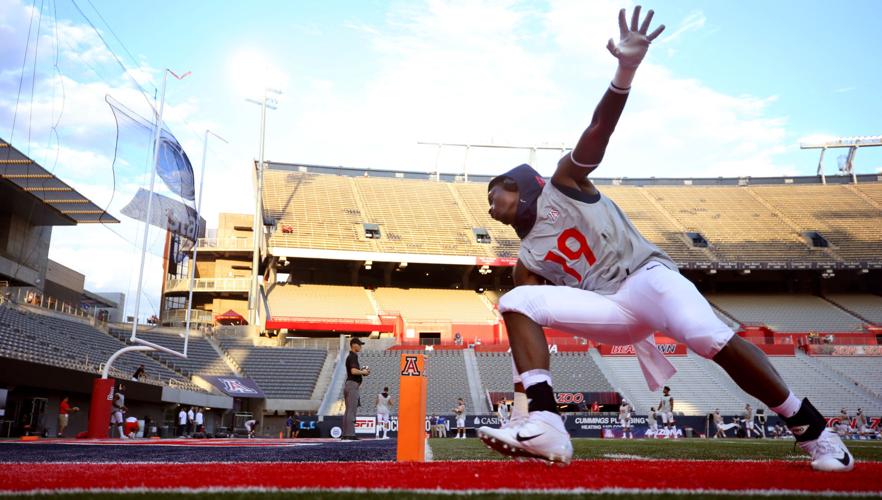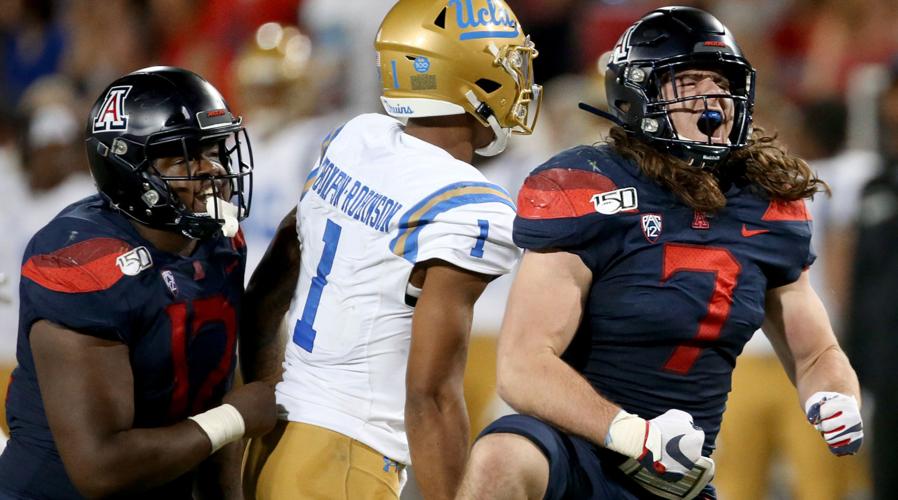Each time I’ve considered how distressing it would be to endure a fall without college football, I think back to what former University of Arizona president Peter Likins told me a few months ago.
“The athletic department budget is about 4% of the school’s total budget,” he said, a shot of perspective I haven’t forgotten.
The UA’s 2020 budget is $2.7 billion. The department of admissions, for example, has more than 70 employees — more than 15 admissions evaluators alone — just to help connect more than 35,000 students and about 4,000 professors.
Do you realize that the UA employs more than 400 custodians?
There is so much more at stake during the coronavirus pandemic than a few postponed football games.
Each time I’ve thought about how regrettable it would be to go a year without a Territorial Cup or a Rose Bowl — or to peacefully fall asleep watching a late-night Oregon-USC football game — something smacks me back to reality.
On Monday afternoon, for example, as I was separating from a group of golf friends, someone mentioned that the Big Ten Conference was strongly considering postponing the 2020 football season.
“We’ll live through it,” said my friend, Larry Howe, part of Monday’s foursome.
Late Monday night, I got an email saying Larry had been life-flighted to the hospital after suffering a heart attack. He had 90% blockage of an artery. Fortunately, he lived through it.
I miss going to the movies. I miss seeing my 7-year-old grandson and 3-year-old granddaughter. I think I’d pay double the list price if I could go to my favorite restaurant and watch the hotly-contested BYU-Utah football game on a big screen.
The world won’t end if we wait a few more months for college football, or if the much-anticipated UA women’s basketball season — a Final Four, perhaps? — is delayed until January.
But that’s just me. Opinions on the Pac-12’s decision to push the football season back to January, at the earliest, are about as tame as a Trump vs. Biden debate.
On Monday, Tom Schooler, father of UA football players Colin and Brenden Schooler, told the Star’s Michael Lev that he would sign a liability waiver to ensure that his sons got to play football in 2020. On Tuesday afternoon, Schooler punched up a tweet that said the Pac-12 had “done dirty” to his sons.
We’ve seen this type of split for months. We’ve seen mask vs. no-mask confrontations. Now it has moved to college football. We’ve seen Nebraska coldbloodedly threaten to play a football schedule independent of its colleagues in the Big Ten. We’ve seen Michigan coach Jim Harbaugh, who has no medical expertise, deliver a manifesto in which he said “we will not cower” from COVID-19.
“We just want to play,” he said. “I am advocating that this virus can be controlled.”
I would not want my son to play for Jim Harbaugh.
This might not be a popular view in Tucson, but after Pac-12 leaders spent 45 minutes Tuesday detailing their unanimous decision to push the football season to 2021, the man I thought best explained the league’s position was Arizona State athletic director Ray Anderson.
“We’re not driven by lawyers who say we’ll relieve you of all accountability,” said Anderson.
Instead, the league will err on the side of health and safety, not finances. The Pac-12 has made its priority the welfare of its volleyball, football and soccer players, not its media rights money.
“We will play again,” said Anderson, who was then asked if the league is prepared for rival conferences such as the SEC, ACC and Big 12 to raid the Pac-12, attempting to get its elite players to bail out for a more risky situation elsewhere.
“Have at it,” said Anderson. “The pandemic is a temporary thing. The Pac-12 is forever. You move forward. Are we going to have short-term (financial) pain? Yes, but you figure it out.”
In a bigger picture, a one-time college football season in the spring — or pre-spring — could turn out to be one of the most enjoyable sporting endeavors imaginable. Try to envision the Territorial Cup played on a beautiful April evening at Arizona Stadium, with COVID-19 under control and 55,000 Tucsonans enjoying what would long be considered a historic occasion.
The waiting is the hardest part. But someday soon we’ll be sitting in movie theaters again. It won’t be long until we can see if UA quarterback Grant Gunnell can save Kevin Sumlin’s job and win the Territorial Cup.
We’ve got so much to look forward to.
The Pac-12 on Tuesday did the right thing. Fully aware that each school could fail to realize about $50 million or more in football revenue — creating financial and personnel issues at each institution that could be felt for many years — the league came together as one, united, determined not to let sports become a matter of life and death.
From Aug. 1:
The Star's Justin Spears, Michael Lev and Alec White break down Arizona's 10-game conference-only football schedule. How many games are the Wildcats expected to win? One college football expert says it could be a forgetful year for the Cats. Plus, is a bubble plan the only way sports can work amid a global pandemic?
Today in history: Aug. 12
Video
Updated1867: Andrew Johnson
Updated
In 1867, President Andrew Johnson sparked a move to impeach him as he defied Congress by suspending Secretary of War Edwin M. Stanton, with whom he had clashed over Reconstruction policies. (Johnson was acquitted by the Senate.)
1909: The Indianapolis Motor Speedway
Updated
In 1909, the Indianapolis Motor Speedway, home to the Indianapolis 500, first opened.
1939: "The Wizard of Oz"
Updated
In 1939, the MGM movie musical “The Wizard of Oz,” starring Judy Garland, had its world premiere at the Strand Theater in Oconomowoc (oh-KAH’-noh-moh-wahk), Wisconsin, three days before opening in Hollywood.
1944: Joseph Kennedy Jr.
Updated
In 1944, during World War II, Joseph P. Kennedy Jr., eldest son of Joseph and Rose Fitzgerald Kennedy, was killed with his co-pilot when their explosives-laden Navy plane blew up over England.
1985: Aircraft Disaster
Updated
In 1985, the world’s worst single-aircraft disaster occurred as a crippled Japan Airlines Boeing 747 on a domestic flight crashed into a mountain, killing 520 people. (Four people survived.)
2000: Submarine Kursk
Updated
In 2000, the Russian nuclear submarine Kursk and its 118-man crew were lost during naval exercises in the Barents Sea.
2004: James E. McGreevey
Updated
In 2004, New Jersey Gov. James E. McGreevey announced his resignation and acknowledged that he’d had an extramarital affair with another man.
2009: Les Paul
Updated
In 2009, guitar virtuoso Les Paul died in White Plains, New York, at 94.
2010: Ed Whitacre
Updated
Ten years ago: General Motors Co. chief Ed Whitacre announced he was stepping down as CEO on September 1, 2010, saying his mission was accomplished as the company reported its second straight quarterly profit. (Whitacre was succeeded as CEO by GM board member Daniel Akerson.)
2013: James "Whitey" Bulger
Updated
In 2013, James “Whitey” Bulger, the feared Boston mob boss who became one of the nation’s most-wanted fugitives, was convicted in a string of 11 killings and dozens of other gangland crimes, many of them committed while he was said to be an FBI informant. (Bulger was sentenced to life; he was fatally beaten at a West Virginia prison in 2018, hours after being transferred from a facility in Florida.)
2015: Jimmy Carter
Updated
Five years ago: Former President Jimmy Carter announced he had been diagnosed with cancer following recent liver surgery.
2015: Tianjin, China
Updated
Five years ago: Deadly warehouse blasts in the Chinese port city of Tianjin claimed 165 lives.
2017: Charlottesville
Updated
In 2017, a car plowed into a crowd of people peacefully protesting a white nationalist rally in the Virginia college town of Charlottesville, killing 32-year-old Heather Heyer and hurting more than a dozen others. (The attacker, James Alex Fields, was sentenced to life in prison on 29 federal hate crime charges, and life plus 419 years on state charges.) President Donald Trump condemned what he called an “egregious display of hatred, bigotry and violence on many sides.”
2019: The Trump Administration
Updated
One year ago: The Trump administration said it was moving ahead with one of its most aggressive steps to restrict legal immigration: denying green cards to many migrants who use Medicaid, food stamps, housing vouchers or other forms of public assistance.





